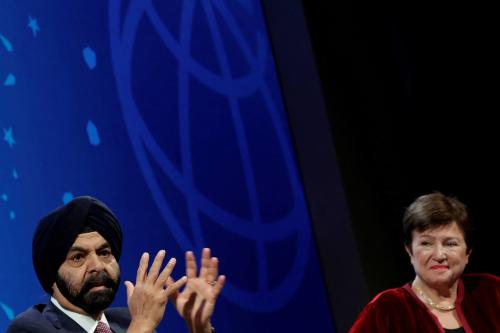

9:30 am EDT - 11:30 am EDT
Past Event
9:30 am - 11:30 am EDT
1775 Massachusetts Ave., NW
Washington, DC
The impact of the U.S. financial crisis has rippled across the globe, prompting concerns about the growth of emerging markets, the future for developing countries and the need for enhanced regulation and a new global financial architecture. On October 10, in advance of the annual meetings of the World Bank and the International Monetary Fund, Global Economy and Development and the Wolfensohn Center for Development at Brookings hosted a discussion on the global implications of the U.S. financial crisis.
The Honorable Wayne Swan, MP, treasurer of the Commonwealth of Australia, provided keynote remarks on “Adapting our Architecture to Challenging Global Times.” James Wolfensohn, former president of the World Bank, and chairman and chief executive officer of Wolfensohn & Company, provided introductory remarks. A panel discussion focused on the global impact of the financial crisis followed. Additional panelists included Brookings Senior Fellow Eswar Prasad, Brookings Senior Fellow and Director of the Latin America Initiative Mauricio Cárdenas, and Brad Setser from the Council on Foreign Relations. Brookings Senior Fellow Homi Kharas moderated the discussion.
Transcript excerpts:
The Honorable Wayne Swan, MP
“Blind faith in markets is of course no substitute for being hard-headed. And blind faith in complete regulation all of the time is also no substitute for being hard-headed. The answer lies not in more or less regulation, but in better regulation.”
Eswar Prasad, Senior Fellow
“Not surprisingly, the instinct of the average policymaker in emerging markets right now is to batten down the hatches, disappear into a deep hole, and stay there until everything blows over. But I think the time for that has past in some sense…”
Mauricio Cárdenas, Director, Latin America Initiative
“Certainly some countries will suffer more, Mexico and Central American being a case of larger impacts, but the region as a whole is a lot more resilient…”


Homi Kharas, Charlotte Rivard
April 16, 2024

Homi Kharas, Charlotte Rivard
April 11, 2024

Brahima Sangafowa Coulibaly, Hafez Ghanem, Wafa Abedin
April 11, 2024